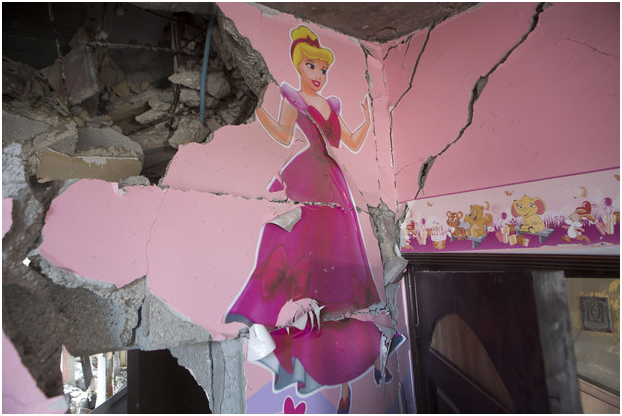'Good Morning' a Sanction to Kill
A child's bedroom in a destroyed home in al-Bureij refugee camp, September 2014.
ELECTRONIC INTIFADA: A report documenting the crimes committed by Israeli soldiers in Gaza during the summer of 2014 has received widespread media coverage lately. But what really struck me about this series of testimonies — gathered by the organization Breaking the Silence — was a short section with the heading “Good morning al-Bureij.”
Al-Bureij refugee camp is where I was born. It is where my family still lives.
I was in Dublin last summer when al-Bureij came under Israeli attack.
From Breaking the Silence’s research, I know that an Israeli commander ordered his troops to blanket-bomb the area. When asked what the troops should target, he told them to pick whatever they wished. “Good morning al-Bureij,” he said to a two-way radio.
That “greeting” amounted to a green light for indiscriminate destruction.
The chilling, albeit brief, details offered by Breaking the Silence reminded me of a phone conversation I had with my dad.
It was July, the hottest month of the year. It was also Ramadan, so people were fasting. My dad’s voice sounded very dry — like he was desperate for a sip of water.
The phone call took place around midday. It only lasted a couple of minutes; the battery in my dad’s phone was running out of power. He wasn’t able to recharge it because of the constant blackouts in Gaza. But it was long enough for him to tell me that he, my mum and seven of my siblings — including a baby — would have to flee al-Bureij later that day.
Israeli tanks were lined up on the east side of the camp. They were shelling every corner of al-Bureij. That is how Israel decided to “wake up the neighborhood,” as one sergeant put it in the Breaking the Silence report.
My dad told me that they were going to head for my Aunty Mukarram’s house in Deir al-Balah, around 15 kilometers to the south.
“I think it is safer there,” my dad said. “We don’t know how we are going, but we are going anyway. Maybe we could walk a little bit and then hitchhike, because it is dangerous for cars to drive. The sky is full of drones, and they target every single moving object. The tanks have not stopped shelling since 4am.”
Salah al-Din road — which runs across the Gaza Strip — was totally empty, my dad added. “Don’t worry about us,” he said. “Take care of yourself and your wife and kids.”
I really did not know what to say next. I searched for words of comfort and support. I couldn’t think of any. I felt helpless. All I could say was ma’assalama yaba. “Goodbye, dad.”
One week later, there was something of a lull in Israel’s violence. It would be an exaggeration to describe it as a ceasefire. Israel was still flying F-16 jets over Gaza’s skies, spreading fear and confusion.
People from al-Bureij — who, like my family, had fled to other camps — availed of the lull to go back. They weren’t intending to stay — it was still too dangerous — but to check on their homes and family and friends who had stayed behind.
My family returned to a hellish scene. It was as if an eight magnitude earthquake had occurred.
Groves full of olive, orange and lemon trees had been burnt and bulldozed. The little bridge that connected the east of al-Bureij to the west over the Gaza valley was reduced to rubble.
Many of the houses that once stood nearby were flattened. The debris of their newly bought washing machines, fridges and TVs were scattered everywhere.
They saw the remains of their clothes, furniture, dressers, kitchen stuff, cars, bicycles. Yet that devastation was considered minor, compared to how our neighbors’ entire family had been wiped out.
My grandparents sought refuge in Gaza during the Nakba (Arabic for catastrophe), the 1948 ethnic cleansing of Palestine. My grandfather, a merchant, was originally from al-Sawafir al-Shamali, 33 kilometers northeast of Gaza. Today, the Israelis call his native village Shafir.
In 1935, my grandfather tried to do some business in the city of Yafa (Jaffa). There, he met his lovely wife, Subheyia. My grandmother.
The violence subjected on al-Bureij last summer was the worst its people had to endure since my grandparents were forcibly uprooted in 1948. Among the victims were 17 members of the Abu Jaber family. The youngest was five months old.
I was stunned to learn that an Israeli commander had approved that violence with words that sound innocuous when stripped from their context. “Good morning al-Bureij.”
(Abdellatif Abdeljawad is an artist from Gaza. He currently lives in Portugal and works as a freelance graphic designer. He has written about Palestinian contemporary art under Israeli occupation)




